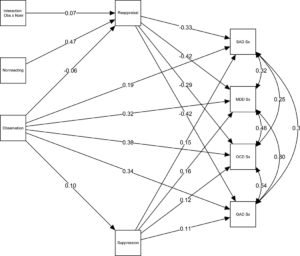Improve Emotional Regulation, Thereby Improving Mental Illness Symptoms, with Mindfulness
By John M. de Castro, Ph.D.
“Through mindfulness you can learn to turn your difficult emotions into your greatest teachers and sources of strength. Instead of ‘turning away’ from pain in avoidance we can learn to gently ‘turn towards’ what we’re experiencing. We can bring a caring open attention toward the wounded parts of ourselves and make wise choices about how to respond to ourselves and to life.” – Melissa O’Brien
Mindfulness practice has been shown to produce improved emotion regulation. Practitioners demonstrate the ability to fully sense and experience emotions, but respond to them in more appropriate and adaptive ways. In other words, mindful people are better able to experience yet control emotions. This is a very important consequence of mindfulness. Humans are very emotional creatures and these emotions can be very pleasant, providing the spice of life. But, when they get extreme they can produce misery and even mental illness. The ability of mindfulness training to improve emotion regulation is thought to be the basis for a wide variety of benefits that mindfulness provides to mental health and the treatment of mental illness especially depression and anxiety disorders.
In today’s Research News article “The Conditional Process Model of Mindfulness and Emotion Regulation: An Empirical Test.” See summary below or view the full text of the study at:
https://www.ncbi.nlm.nih.gov/pmc/articles/PMC5340204/
Curtiss and colleagues examine potential emotional regulation intermediaries between different facets of mindfulness and improvements in mental health. They posit that mindfulness, particularly non-reactivity, produces increased emotion regulation and this in turn produces improvements in the symptoms of mental illness, while observation interferes with emotion regulation, resulting in exacerbation of symptoms. They recruited adults who self-reported medically diagnosed mental illnesses. The participants completed on-line measures of mindfulness and emotion regulation and the symptoms of mental illness of anxiety, feeling evaluated by others, depression, obsessions, and compulsions.
They found that, as predicted, the higher the levels of mindful non-reactivity, the lower the levels of mental illness symptoms while the higher the levels of mindful observing, the higher the levels of symptoms. They then performed sophisticate statistical modelling to determine if the cognitive strategies of emotion regulation of suppression and reappraisal acted as intermediaries. They found that there were small effects of observing on both suppression and reappraisal but the main influence was a direct effect of observing of increasing symptoms. Non-reacting, on the other hand had a strong positive effect only on reappraisal which in turn lowered symptoms.
The cognitive emotion regulation strategy of suppression is a dampening maladaptive strategy involving attempts to inhibit unwanted thoughts or outward displays of emotion. Enhancing suppression is maladaptive and ineffective and results in heightened symptoms of mental illness. Only the mindfulness facet of observing increases suppression. Observing is an attentional process. It may heighten suppression by making the individual more aware of the symptoms, eliciting attempts to keep them in check. But, this is counterproductive, actually making things worse.
On the other hand, the cognitive emotion regulation strategy of reappraisal is an augmenting adaptive emotion regulation strategy, involving developing alternative or benign interpretations of a stressful situation to reduce distress. Reappraisal is particularly effective for people with mental illnesses in that these individuals often have interpretations of situations that reinforce and exacerbate the illness. Enhancing reappraisal, then, is adaptive, especially for people with mental illnesses, resulting in a lessening of the symptoms of mental illness. The mindfulness characteristic of non-reacting strongly increases reappraisal and thereby lessens symptoms. Non-reacting involves refraining from responding to emotions or thoughts in a reactive manner. This allows for reappraisal and thereby symptom improvement.
The study’s results are very interesting and support a model of an indirect effect of the mindfulness facet of non-reacting; improving the symptoms of mental illness by encouraging reappraisal. On the other hand, the mindfulness facet of observing makes symptoms worse directly and by increasing the maladaptive suppression strategy. Hence, the results suggest that mindfulness training should focus on non-reacting and minimize observing to improve mental health.
So, improve emotional regulation, thereby improving mental illness symptoms, with mindfulness.
“When we build awareness, such as through the practice of mindfulness, we notice our emotions more clearly and with less resistance. We recognize our mental habits and actively choose to leave things alone for a moment instead. ‘I’m in a bad mood, it’s not my fault or anyone else’s, and it will pass.’” – Mark Bertin
CMCS – Center for Mindfulness and Contemplative Studies
This and other Contemplative Studies posts are also available on Google+ https://plus.google.com/106784388191201299496/posts and on Twitter @MindfulResearch
Study Summary
Curtiss, J., Klemanski, D. H., Andrews, L., Ito, M., & Hofmann, S. G. (2017). The Conditional Process Model of Mindfulness and Emotion Regulation: An Empirical Test. Journal of Affective Disorders, 212, 93–100. http://doi.org/10.1016/j.jad.2017.01.027
Abstract
Background
The conditional process model (CPM) of mindfulness and emotion regulation posits that specific mediators and moderators link these constructs to mental health outcomes. The current study empirically examined the central tenets of the CPM, which posit that nonreactivity moderates the indirect effect of observation on symptoms of emotional disorders through cognitive emotion regulation strategies.
Methods
A clinical sample (n=1667) of individuals from Japan completed a battery of self-report instruments. Several path analyses were conducted to determine whether cognitive emotion regulation strategies mediate the relationship between observation and symptoms of individual emotional disorders, and to determine whether nonreactivity moderated these indirect effects.
Results
Results provided support the CPM. Specifically, nonreactivity moderated the indirect effect of observation on symptoms through reappraisal, but it did not moderate the indirect effect of observation on symptoms through suppression.
Limitations
Causal interpretations are limited, and cultural considerations must be acknowledged given the Japanese sample
Conclusions
These results underscore the potential importance of nonreactivity and emotion regulation as targets for interventions.

One thought on “Improve Emotional Regulation, Thereby Improving Mental Illness Symptoms, with Mindfulness”